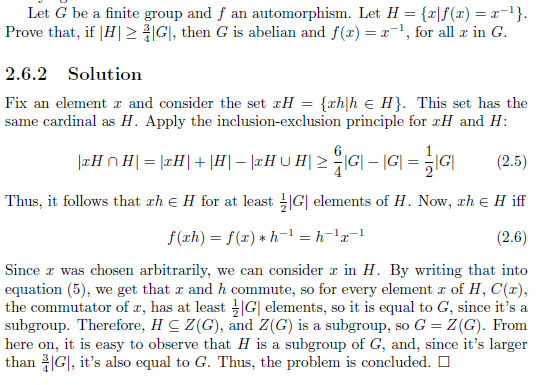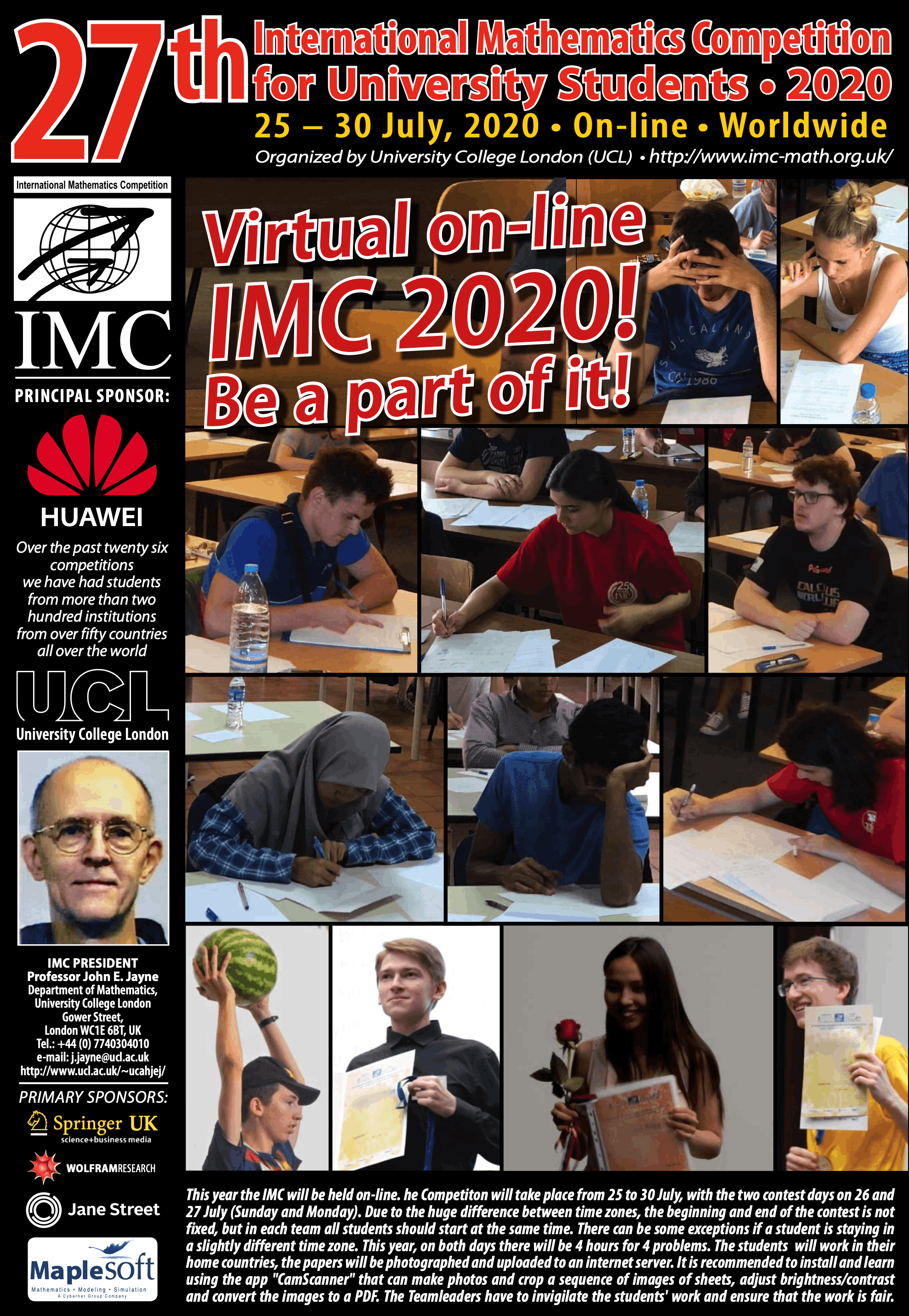Hi there folks! Long time no see! Lots of things happened ever since the last article: I took my exams, summer holiday started, and the first online International Mathematics Competition for University Students took place. It has been a long-while dream of mine to take part in this competition, and I was hell-bent on participating this year. Turns out, however, that I didn't get to participate the way I wanted; due to the Covid-19 pandemic, it was held online.
As a teamless student, I was supervised by Ivan the Confessor, alongside many other teamless students, on a Google Meet call. We had several possible timezones in which we could take the contest: the European timezone, which was from 7 AM UTC to 11 AM UTC, the Asian timezone, from 2 AM UTC to 6 AM UTC, and the American timezone, from 2 PM UTC to 6 PM UTC. Of course, as the chad I am, I woke up at 2 AM UTC aka 5 AM Romanian time and solved the problems then. Just kidding, I took the contest in the European timezone. My computer's camera crashed, and I had to shut it down and use the phone in order to record myself and my desk instead.
Since the Olympiads ended for me in the 12th grade, I forgot how it felt to actually be in a contest, especially an international one. So, as the contest began, I was incredibly scared. Fortunately, this fear always passes when the subjects come. One important thing to note about me: I cough whenever I'm nervous. It's not a very quiet cough, but an incredibly loud one, with sound waves travelling through all 11 dimensions of M-string theory and beyond. My cough is literally Covid-20. This time, however, I didn't feel the need to cough, which was pretty odd.
After printing the subjects, I swiftly started working on them. I solved the second problem first, since it was a matrix problem; it couldn't have taken me more than 10 minutes. The problem is as follows:
Let \(A, B \in M_n(\mathbb{R})\) such that \(rk(AB-BA+I)=1\). Prove that \(Tr(ABAB)-Tr(A^2B^2)=\frac{1}{2}n(n-1)\).
Solution: It is a pretty known fact that, if \(A \in M_n(\mathbb{R})\) is a matrix of rank \(r\), then there exist matrices \(E \in M_{n,r}(\mathbb{R})\) and \(F \in M_{r,n}(\mathbb{R})\) such that \(A=EF\). In this case, these matrices were vectors, so \(A^2=EFEF=E(FE)F\), where \(FE\) is a real number due to matrix multiplication. Since \(FE=Tr(FE)=Tr(A)\), we get that \(A^2=Tr(A)A\), which characterizes all matrices of rank 1. Let us apply that in our problem.
By squaring, we get that
\((AB-BA+I)^2=\)
\(Tr(AB-BA+I)(AB-BA+I)\), which is equal to \(n(AB-BA+I)\). If we apply trace again, and equalize the traces in \((AB-BA+I)^2\), we get the conclusion.
The problem wasn't too hard, but it required a trick. Another possible way of doing it would have been with the Jordan canonical form, but it revolved around the same trace idea.
The first problem of the contest wasn't my cup of tea. It was combinatorics, and I'm not trained in it. It took me about an hour and hour and 45 minutes to finally catch on to it, after failing miserably at calculations that shouldn't have been too hard. Here's the problem:
Let \(n \in \mathbb{N}^*\). Compute the number of words \(w\) that satisfy all the following properties:
(1): \(w\) consists of \(n\) letters, all of them from the alphabet {a,b,c,d}.
(2): \(w\) has an even number of a-s
(3): \(w\) has an even number of b-s
Solution: First, let us observe that the total number of words is \(4^{n}\), for a certain \(n\). Consider the following sequences:
\(a_n\) = number of n-words containing an odd number of both a and b;
\(b_n\) = number of n-words containing an odd number of a or an odd number of b, but not an odd number of both;
\(G_n\) = number of n-words containing an even number of both a and b, e.g 'good' words.
Thus, \(a_n+b_n+G_n=4^n\). Now, let's find a recurrence. We can obtain a word with a or b odd, but not both odd, by adding a c or a d to a word with only one odd, an a or a b to a word with both odd, and an a or a b to a good word. Thus, \(b_{n+1}=2(a_n+b_n+G_n)=2 \cdot 4^{n}=2^{2n+1}\).
By a similar argument, \(G_{n+1}=b_n+2G_n\), so we have that \(G_{n+1}-2G_n=2^{2n-1}\). After solving the recurrence, we obtain that \(G_n=4^{n-1}+2^{n-1}\). Of course, I couldn't observe this without making calculation mistakes; still, I eventually solved the problem correctly.
After solving these 2 problems, I looked over problem 3. Seeing that I couldn't read it, I skipped over to problem 4. Problem 4 was a result about polynomials, and it was solvable, if you knew enough Complex Analysis and had the brilliance to figure out that it was a Complex Analysis problem. I didn't have that brilliance.
I was pretty pleased with myself for proving 2 of the 4 problems, and I was already envisioning myself winning a first prize. Then, second day came, with 4 new problems for me to attempt. I solved the first one in the first 45 minutes of the contest, and then struggled for the rest of the contest on the second one. Here's the proof that I gave for the first problem:
Find all \(f:\mathbb{R}\to (0,\infty)\) twice differentiable functions such that \(f ''(x)f(x)\geq 2(f '(x))^2\).
Solution: One first observation is that \(f\) is convex. Indeed, since \(f\) and \((f '(x)^2\) are both positive, \(f ''(x)\) is also positive.
The second observation is the one that took me the most of those 45 minutes. Let's look at \(\frac{1}{f}\). Observe that its second derivative is exactly \(2(f'(x))^2-f''(x)f(x)\leq 0\), so \(\frac{1}{f}\) is concave. It is a known fact that the only strictly positive concave functions are constant ones, so \(\frac{1}{f}\) is constant, and \(f\) is, thus, a positive constant. During the contest, I said that the only functions satisfying \(f\) convex and strictly positive and \(\frac{1}{f}\) concave are constant ones, but I discussed the fact poorly; thus, I lost one point. More on that later.
Next, for the following 3 hours, I tried solving problem 2. Problem 2 went as follows:
Find all prime numbers \(p\) such that there is only one \(a \in \{1, 2, ... p\} \) such that \(p | a^3-3a+1\).
Solution: For the rest of the proof, we shall work in \(\mathbb{Z_p}\). I wanted to prove that, if the equation has a solution, there must also be another one, a function of \(a\). Here's the trick: see that, if \(a\) is a solution, \(a^2-2\) is also a solution. One can also check that \(-a^2-a+2\) is a solution. How could you possibly see these solutions? By looking at the solutions of \(X^3-3X+1\), which you could find through Cardano's formula. By solving the resulting equations, it could be seen that \(p=3\) is the only solution.
Another possible solution, one that one of my friends found, was by working with grade two equations in \(\mathbb{Z_p}\) and discriminants. Another one thought of using a trick found in an old IMO, that said that, if such p exists, then it's of the form \(9k+1\) or \(9k-1\). This trick used field extensions, which were used in one of the official solutions. Problem 3 of the second day was something about groups, which actually looked doable, but I spent all of my time on problem 2, hoping that it was a trick that I'd figure out.
After the time was up, I scanned the solutions and uploaded them in a Dropbox. Funny story: after the first day, I sent an email, asking if my problems were sent. An organizer replied that they were sent, but that, on problem 3's solution, I only wrote the number of the problem. To that, I replied: 'Yup, it's intentional.' XD
The results started coming the next day. The people at IMC were uploading results problem by problem, and they started uploading them at 2 am Romanian time. One of my friends and I waited for the results for a while. They stopped uploading results at 3:15 am. I kept waiting until 4 am. They resumed uploading results in the morning, and finished at 12:00 Romanian time. The next day, they also announced the prizes. I got 29 points, and a second prize; firsts were given to those with 30 or more. So, because of that faulty explanation, I lost the point that would have gotten me a first. You have no idea how annoyed I was when I saw that XD
Overall, this IMC was a pretty pleasant experience. I haven't prepared too much for it, so life has done me justice; getting a gold medal, the same prize as many people that have been preparing for the whole year, would have been unfair. I'll definitely be participating at next year's IMC, which will hopefully take place IRL, in Blagoevgrad, as it should have taken place this year. Hope that 1 point won't meme me again.
Before I end this article, I want to announce something: I'm writing a Maths problem book! It will contain problems highlighting interesting techniques and ideas, and it will probably be open access. The book could be used as preparation material for Student Competitions or Romanian Olympiads. I'll probably release an early access version in October, after adding more problems. At the time of speaking, the book has 40 pages with fully solved problems. It includes chapters on Algebra, Analysis, Applied Mathematics, and, something that I've picked up only recently, Formal Theorem Proving! For the last one, I'm using a Proof Assistant Program called Lean. The book will contain problems that I haven't added on this blog, such as the following:

Anyway, it's time to end this post. Tune in next time for some Algebra, Complex Analysis, Mathematical Physics, my thoughts on stuff, or something completely random!
Cris.
